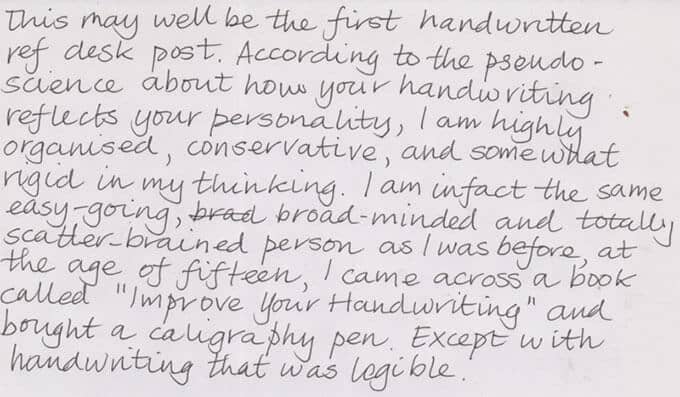There has been much written in the media over the last several months about the supposed death of handwriting, with some writers gladly bidding goodbye to cursive.
Which is all very funny, given the results of a new study coming out of the University of Washington. Perhaps you’ve heard. Researchers found that children wrote faster and wrote more when composing essays with pen and paper than when using keyboards.

Bartmoni [CC BY-SA 3.0 (https://creativecommons.org/licenses/by-sa/3.0)]
According to the university, the study of 200 normally developing second, fourth and sixth-grade children conducted by educational psychology professor Virginia Berninger worked like this:
For one task they were told to print all lower case letters in alphabetic order with a pen. They were also asked to select each letter of the alphabet in order on a keyboard. In both cases they were told to work as quickly and accurately as possible. In the second task they were asked to write one sentence that began with the word “writing” while using a pen and to write one sentence that began with “reading” while using the keyboard. Finally, the children were asked to write essays on provided topics for 10 minutes both by pen and by keyboard.
(We contacted Berninger to find out whether the children all used the same kind of pen, and if so, what kind. She said the tests were conducted using fine-tip felt markers.)
The results?
Only for writing the alphabet was the keyboard better than the pen. For sentences results were mixed. But when using a pen, the children in all three grade levels produced longer essays and composed them at a faster pace. In addition, fourth and sixth graders wrote more complete sentences when they used a pen. The ability to write complete sentences was not affected by the children’s spelling skills.
In other words, the plain old pen was more effective for them than a computer when trying to communicate complex thoughts in an extended manner. Why? Researchers believe it might have to do with how forming letters by hand, rather than by selecting keys, effects the cognitive process.
Huh. Wonder how that’s going to work out as schools continue transitioning away from handwriting and toward solely computer-based writing. Some testing organizations in the US even plan to eliminate handwritten writing tests in favor of tests completed by keyboard.
In an interesting recent column in The Guardian, since removed because the rights expired (?), novelist Umberto Eco blamed not the computer, but the ballpoint pen.
Early ballpoints were also very messy and if, immediately after writing, you ran your finger over the last few words, a smudge inevitably appeared. And people no longer felt much interest in writing well, since handwriting, when produced with a ballpoint, even a clean one, no longer had soul, style or personality.
OK, that’s a unique take, but you can always erase ink smudges from the paper but the question is whether any of this matters.
Eco argues yes, for adults – “thanks to the resistance of pen and paper, it does make one slow down and think” – and for children, who learn hand-eye coordination from handwriting.
In the UK, the National Handwriting Association calls handwriting a “crucial component of literacy,” and it’s a part of the of the National Curriculum, but not heavily emphasised.

Some independent schools still place a great deal of importance on the subject, however, as you might remember from an earlier post about the effect of fountain pens on children’s handwriting. Bryan Lewis, headmaster of the Mary Erskine and Stewart’s Melville Junior School, wrote in the Edinburgh Evening News that:
Children who are proud of the standards they set for themselves are far more likely to achieve academic success and for that reason, excellent handwriting, just like excellent manners and a commitment to hard work, is a crucial component of the education we provide.
(And here’s another school that sees handwriting as a key part of the learning process.)
Emily Yoffe, in a recent article on handwriting in Slate, included this counter-argument from another educator:
Steve Graham, professor of education at Vanderbilt University who has worked with Berninger, says the actual evidence in favor of handwriting is weak. He says that if we really wanted to improve children’s language skills, we would place enough computers in classrooms so that there was a keyboard at every desk. Sure, he says, kids need a basic ability to handwrite letters, but for fluency with the written word the keyboard is far superior. Children can easily correct mistakes and move text, and when they print out their work it’s guaranteed to look good. “It’s more motivating,” says Graham.
Still, that seems to miss the point of what Berninger is saying, which is that, “we don’t want to lose sight of the fact that it is important for developing writers and children with transcription disability to be able to form letters by hand. A keyboard doesn’t allow a child to have the same opportunity to engage the hand while forming letters.”
She doesn’t advocate the use of pen and paper over computers for children learning to write. Instead, she recommends teaching children with both and says we need further study to learn more about the differences in how the brain works when writing by hand as opposed to by keyboard. We may discover that one or the other, or a combination of both, help us to learn and process information better.
That seems perfectly reasonable.
Now jump in, readers, and tell us what you think. Does handwriting still matter, or should we abandon it in favor of our laptops and QWERTY cell phones?
For taking notes while sitting at my desk, I find myself using my notebook less and less and the Notepad program in Windows more and more. Where one notebook would last me a week, maybe two, a year ago, now a notebook can last a couple of months. But you’re right, nothing beats a pen and a notebook when you’re mobile. Who wants to try taking notes on the tiny keypad of a cell phone or PDA or juggling a laptop in the middle of a conversation? I also tend to use my notebook more than my computer for lists like groceries, to-do tasks, etc. I’ve never been able to find a good to-do app that I like.
Alright, this is coming from someone who uses a cellphone regularly, types like a maniac, and loves computers.
I still like using notebooks for things.
when it comes to checklists, I know there’s a gmail app from the labs that works the same way, and something on my phone, but it just doesn’t replace a paper checklist. which, I’ve yet to find a web app that will remind me about things without setting off an alarm for my phone or computer, so until then, there’s post-it’s and circling stuff in my notebooks.
but there’s just something about paper and writing on it that makes things more solid for me. It’s how I usually study, but rewriting things down on paper, I also am an avid journaler, and keep a notebook for that, and I write at least parts of my stories on paper, then eventually transfer them to computer for editing and review.
I don’t have fantastic handwriting, because I never bothered learning it and practicing the styles, but mine is a lot better than most of my friend’s–in fact, most of them, I’ve never seen write.
Eventually they may work out the kinks or come up with an electric version of a proper notebook, but until then, I like my paper and handwriting.